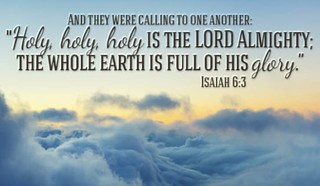
- Recent Translations
- All Translations
Isaiah 6
Share
Settings
Isaiah 6 Commentary
Chapter 6
The vision which Isaiah beheld in the temple. (1-8) The Lord declares the blindness to come upon the Jewish nation, and the destruction which would follow. (9-13)
Verses 1-8 In this figurative vision, the temple is thrown open to view, even to the most holy place. The prophet, standing outside the temple, sees the Divine Presence seated on the mercy-seat, raised over the ark of the covenant, between the cherubim and seraphim, and the Divine glory filled the whole temple. See God upon his throne. This vision is explained, ( John 12:41 ) , that Isaiah now saw Christ's glory, and spake of Him, which is a full proof that our Saviour is God. In Christ Jesus, God is seated on a throne of grace; and through him the way into the holiest is laid open. See God's temple, his church on earth, filled with his glory. His train, the skirts of his robes, filled the temple, the whole world, for it is all God's temple. And yet he dwells in every contrite heart. See the blessed attendants by whom his government is served. Above the throne stood the holy angels, called seraphim, which means "burners;" they burn in love to God, and zeal for his glory against sin. The seraphim showing their faces veiled, declares that they are ready to yield obedience to all God's commands, though they do not understand the secret reasons of his counsels, government, or promises. All vain-glory, ambition, ignorance, and pride, would be done away by one view of Christ in his glory. This awful vision of the Divine Majesty overwhelmed the prophet with a sense of his own vileness. We are undone if there is not a Mediator between us and this holy God. A glimpse of heavenly glory is enough to convince us that all our righteousnesses are as filthy rags. Nor is there a man that would dare to speak to the Lord, if he saw the justice, holiness, and majesty of God, without discerning his glorious mercy and grace in Jesus Christ. The live coal may denote the assurance given to the prophet, of pardon, and acceptance in his work, through the atonement of Christ. Nothing is powerful to cleanse and comfort the soul, but what is taken from Christ's satisfaction and intercession. The taking away sin is necessary to our speaking with confidence and comfort, either to God in prayer, or from God in preaching; and those shall have their sin taken away who complain of it as a burden, and see themselves in danger of being undone by it. It is great comfort to those whom God sends, that they go for God, and may therefore speak in his name, assured that he will bear them out.
Verses 9-13 God sends Isaiah to foretell the ruin of his people. Many hear the sound of God's word, but do not feel the power of it. God sometimes, in righteous judgment, gives men up to blindness of mind, because they will not receive the truth in the love of it. But no humble inquirer after Christ, need to fear this awful doom, which is a spiritual judgment on those who will still hold fast their sins. Let every one pray for the enlightening of the Holy Spirit, that he may perceive how precious are the Divine mercies, by which alone we are secured against this dreadful danger. Yet the Lord would preserve a remnant, like the tenth, holy to him. And blessed be God, he still preserves his church; however professors or visible churches may be lopped off as unfruitful, the holy seed will shoot forth, from whom all the numerous branches of righteousness shall arise.
Isaiah 6 Commentaries
Chapter Summary
INTRODUCTION TO ISAIAH 6
This chapter contains a vision of the glory and majesty of Christ, the mission and commission of the prophet, and the destruction of the Jews. In the vision may be observed the time of it, and the object seen; who is described by the throne on which he sat, Isa 6:1 and by his ministers about him; and these, by their name, by their situation, by their wings and the use of them, and by their employment, Isa 6:2,3 and by the effects their crying to one another had upon the place where they were, Isa 6:4 and next follows the effect the whole vision had on the prophet, which threw him into great distress of mind; and the relief he had by one of the seraphim, and the manner of it, Isa 6:6,7 upon which a question being put, concerning sending some person, the prophet makes answer, expressing his readiness to go, Isa 6:8 when a commission is given him, and the message he is sent with is declared, Isa 6:9,10 whereupon he asks how long it would be the case of the Jews mentioned in the message he was sent with; and he is told it would continue until the utter destruction of them, Isa 6:11,12 and yet, for the comfort of him and other saints, it is intimated that there would be a remnant among them, according to the election of grace, Isa 6:13.

